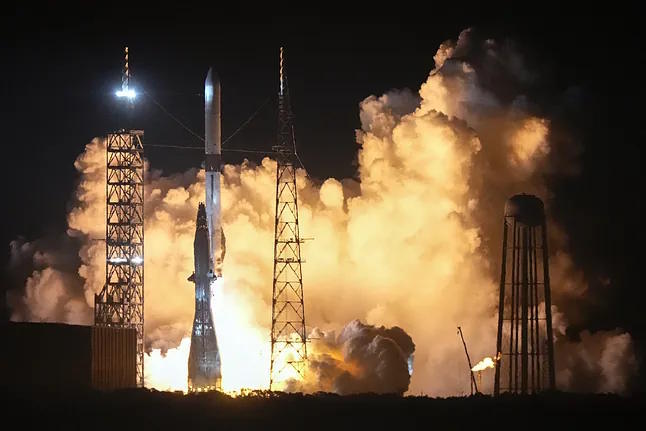Jeff Bezos had been waiting for this day for a long time. Blue Origin, his aerospace company, has successfully carried out the first flight of its super rocket New Glenn, the largest and most powerful developed by this private company. With this, the American magnate aims to compete with SpaceX's launchers from his rival Elon Musk, who quickly congratulated him through his social network X. "Congratulations on reaching orbit on the first attempt Jeff Bezos!" Musk wrote.
The coincidence led the two richest men on the planet to test their respective super rockets on the same day but from different locations. If there are no further delays due to technical or weather reasons, Musk will conduct the seventh test of his impressive 121-meter Starship tonight from Texas, considered the largest and most powerful in the world alongside the Space Launch System (SLS) used by NASA for missions to the Moon.
The New Glenn's liftoff, however, took place from Cape Canaveral in Florida, where Blue Origin has facilities rented for their launches. The flight began after 8 in the morning (Peninsula time). The window for the first test opened at 7 o'clock, with a three-hour timeframe, but they did not need to use all of it.
An hour later, engineers gave the go-ahead for liftoff, which on the previous Monday, during the first flight attempt, was aborted due to technical anomalies. At 8:03, the impressive 98-meter tall and seven-meter wide rocket, one of the largest and most powerful in the world, roared as it began its first test.
The liftoff of the New Glenn, the separation of components, and the rocket's flight proceeded as planned, as indicated by the applause and excitement from the team members.
Thus, Bezos successfully achieved the main goal of this test mission on the first attempt, which was to orbit safely. However, they did not achieve the secondary goal of attempting to recover a part of the rocket on a maritime platform, as the New Glenn was designed to be reusable to reduce space mission costs. During the broadcast, the company reported the loss of the booster or propulsor, the part they were trying to recover. As Blue Origin's director Dave Limp had emphasized in the days leading up to the launch, "anything beyond orbiting was considered an extra." By the way, they call the booster So You're Telling Me There's a Chance.
"We did it! Orbital. Great night for Team Blue," Limp noted in a post with the launch video moments after liftoff. Bezos, on his part, shared the liftoff video.
Jeff Bezos announced in 2016 the program to develop this large launcher, whose first inaugural flight was set for 2020 but faced delays. With the New Glenn, named in honor of John Glenn, the first NASA astronaut to orbit the Earth, he aims to put large payloads into orbit and compete with Elon Musk's Starship. Possible uses for this private launcher include NASA missions, spacecraft, Amazon's internet satellites, or components for the future space station that Blue Origin aims to build with other companies.
Until now, Blue Origin's launches have used a much smaller suborbital rocket, the New Shepard, paying tribute to the first U.S. astronaut, Alan. This partially reusable launcher has conducted around twenty flights with tourists experiencing weightlessness for a few minutes. Bezos himself was one of the passengers on one of these 10-minute flights in July 2021, reaching an altitude of 107 kilometers. He was accompanied by his brother Mark, pilot Wally Funk, and student Oliver Daemen. "It was the best day of my life," said the Amazon founder and owner of The Washington Post after disembarking from the spacecraft.
Today is undoubtedly a day of celebration for the Amazon founder and owner of The Washington Post, who has now entered the league of rocket operators capable of orbital flights, directly competing with SpaceX, whose seventh test of the Starship super rocket is ongoing.
